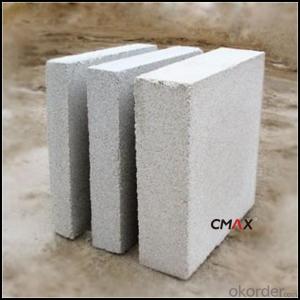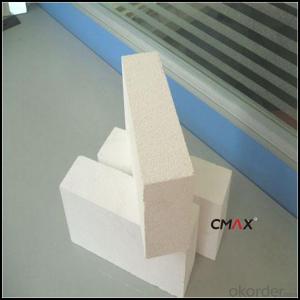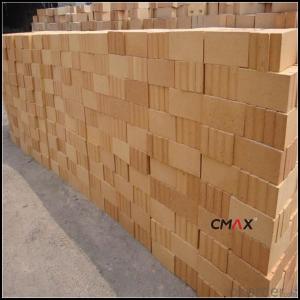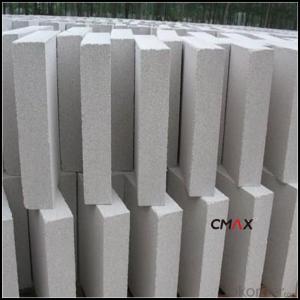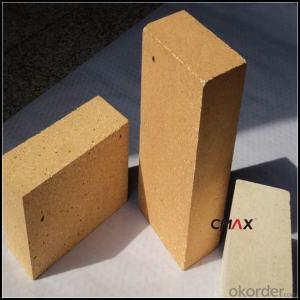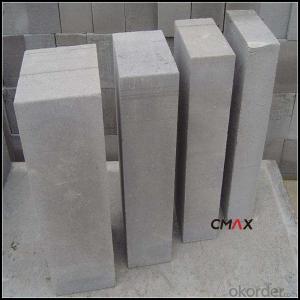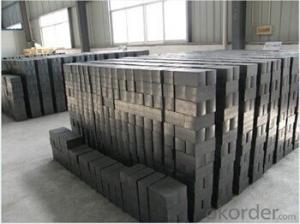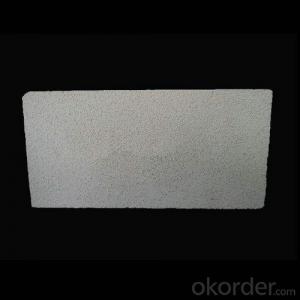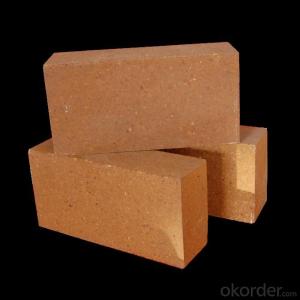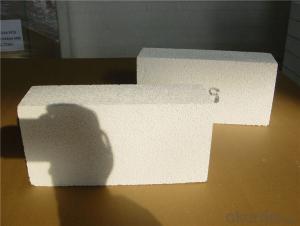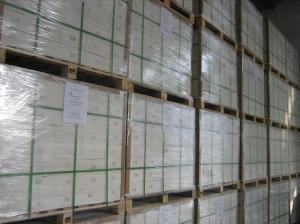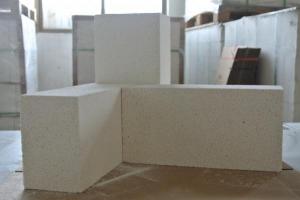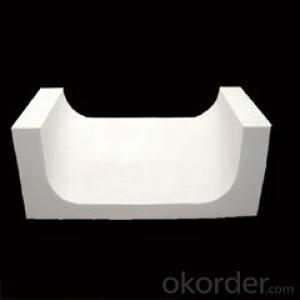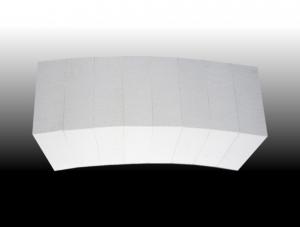High Temperature Insulation Brick
- Loading Port:
- China main port
- Payment Terms:
- TT OR LC
- Min Order Qty:
- 2 m.t
- Supply Capability:
- 2000 m.t/month
OKorder Service Pledge
OKorder Financial Service
You Might Also Like
Insulating Brick
CMAX insulating firebricks are classified under temperature between 1300℃ to 1700℃, manufactured from high purity alumina clay.
High strength clay heat insulation refractory brick use high quality hollow drift beads and super clay as the main raw material, through high heat sintering. With the characteristics of high strength, low thermal conductivity, is suitable for industry kiln under 1350 ℃ heat insulation layer and the lining.
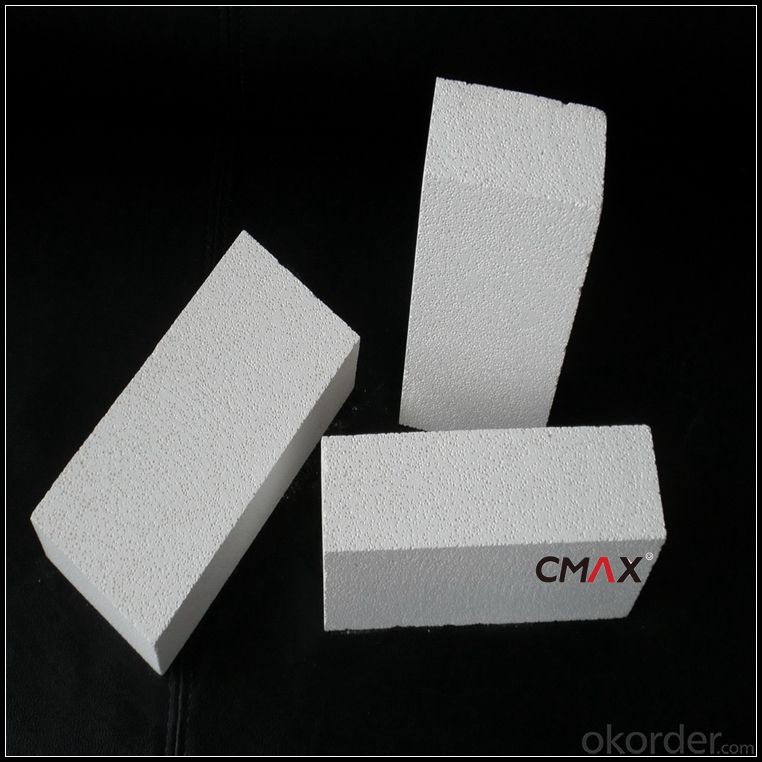
Insulating Brick Features
1)Excellent wear resistance
2)Good impact resistance.
3)Good corrosion resistantce.
4)Good adherence
Insulating Brick Application
1)Excellent wear resistance and long working life.
2)Good impact resistance.
3)Good corrosion resistance.
4)Good thermal shock resistance
5)High wear resistantance
6)Smooth surface and good adherence resistance.
Insulating Brick Data Sheet
Classification Temperature (℉/℃) | 3000/1650 |
Bulk Density (g/cm3 ) | ≤1.0 |
Thermal Conductivity | |
800℃, W/m.K | ≤0.39 |
1000℃, W/m.K | ≤0.43 |
1200℃, W/m.K | ≤0.48 |
Reheating Linear Change (%) | 1550℃×12h |
≤0.9 | |
Chemical Composition (%) | |
Al2O3 | ≥75 |
Fe2O3 | ≤0.5 |
Packaging & Shipping
Packaging Details:Be packed in fumigated wooden pallets
Delivery Detail: 30 days after order
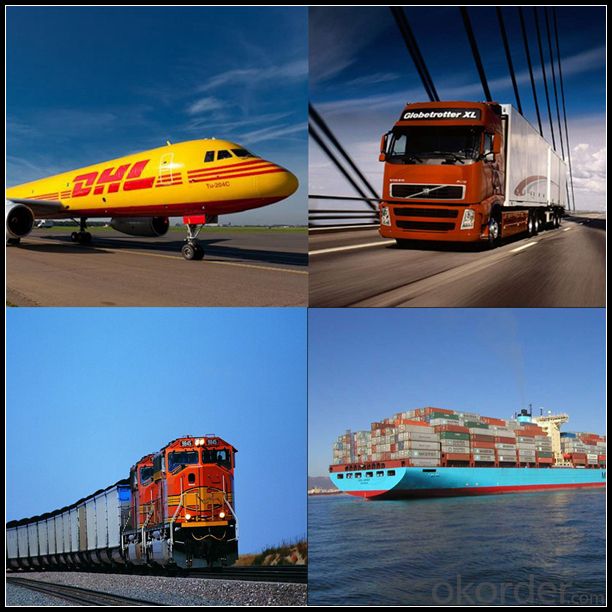
Our Services
Optimum solution and product supply of refractories for high temperature industries, such as iron steel, non-ferrous, petrochemical and building materials.
Engineering design, contract and consult for refractories, and civil architecture design.
Research, development, manufacture and sale of superhard materials.
R&D, manufacture and sale of special packing materials for export.
Inspection, supervision and arbitration of refractories.
Consultation and services in refractories information.
Training and cultivation of high-level talents in refractories profession
Sales Network

Company Information
CNBM (China National Building Material) Group is the largest comprehensive building materials group in China that in integrate scientific research, manufacturing and logistics into one entity. The largest building materials and equipment specialists in China. Upon State Council approval, today CNBM owned more than 300 subordinate manufacturing factories and servicing companies. There are 6 fully owned public listed companies and 11 partially owned with substantial shares public listed companies. In many of these fields, CNBM is playing the leading role in the building industry in the country.
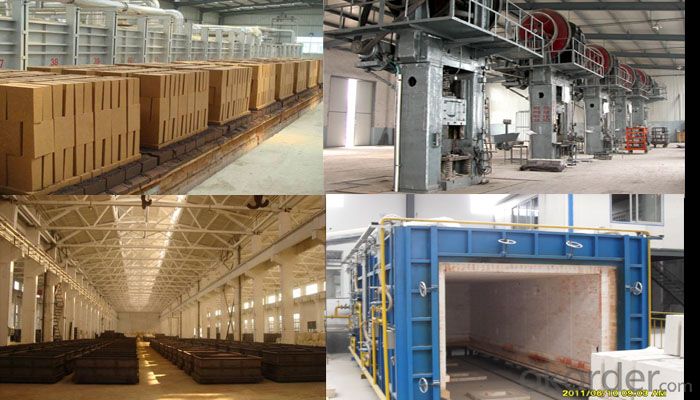
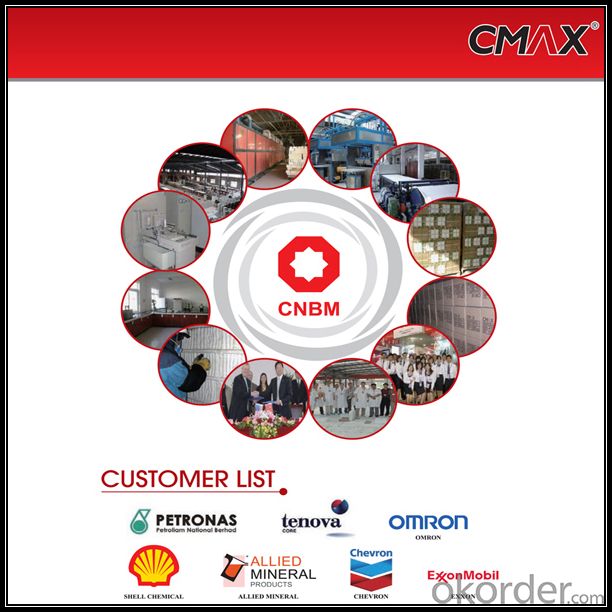
FAQ
1. Which products do you have?
We have all kinds of refractory brick, castable, mortar, cement, ceramic fiber products, etc.
Or you could browse our products to choose what you need.
2. Can you give me a brief introduction of the application of your products?
We are mainly specializing in the refractory materials in iron and steel, cement, glass, ceramics, petrochemical, electric power Industry, etc.
3. If I need your offer, what information do you need?
In order to choose suitable products, it will be appreciated to provide us the information, such us specification, technical data, order quantity, products application etc. If any question, please contact us freely.
- Q:Can insulating fire bricks be used in chimneys or flues?
- Insulating fire bricks are not recommended for use directly in chimneys or flues. While these bricks are designed to withstand high temperatures, they are primarily used for insulation purposes rather than as a structural component. Chimneys and flues require bricks that are specifically engineered to withstand the intense heat and corrosive byproducts of combustion. These bricks, known as refractory bricks, are designed to have high thermal resistance and exceptional durability to ensure the safe and efficient operation of the chimney or flue. Therefore, it is advisable to use refractory bricks instead of insulating fire bricks when constructing or repairing chimneys and flues.
- Q:Can insulating fire bricks be used in applications involving molten metal?
- Insulating fire bricks offer a viable option for applications utilizing molten metal. Crafted from lightweight refractory materials possessing exceptional thermal insulation properties, these bricks effectively endure high temperatures and deliver insulation and heat transfer protection. In scenarios involving molten metal, insulating fire bricks can serve as linings in furnaces, crucibles, and other equipment, effectively preventing heat loss and maintaining the desired temperature. Additionally, they function as a barrier between the molten metal and structural components, effectively averting damage or contamination. Nevertheless, it is crucial to acknowledge that the appropriateness of insulating fire bricks for a particular molten metal application hinges on factors such as temperature, metal type, and specific process requirements.
- Q:Can insulating fire bricks be used for insulation in smelting furnaces?
- Yes, insulating fire bricks can be used for insulation in smelting furnaces. They are designed to withstand high temperatures and provide excellent thermal insulation, making them an ideal choice for smelting furnace insulation to minimize heat loss and improve energy efficiency.
- Q:Are insulating fire bricks suitable for commercial or industrial applications?
- Yes, insulating fire bricks are suitable for commercial and industrial applications. They are commonly used in high-temperature environments such as furnaces, kilns, and ovens, where they provide excellent insulation and heat resistance. Their ability to withstand extreme temperatures and thermal shock makes them ideal for commercial and industrial settings where heat containment and energy efficiency are crucial.
- Q:Are insulating fire bricks resistant to corrosion?
- Yes, insulating fire bricks are generally resistant to corrosion. Insulating fire bricks are made from high-temperature materials such as alumina, silica, and other refractory materials, which provide excellent resistance to chemical corrosion. These bricks are specifically designed to withstand high temperatures and harsh environments, making them highly resistant to corrosion caused by acids, alkalis, and other corrosive agents. However, it is important to note that the level of corrosion resistance may vary depending on the specific composition and manufacturing process of the insulating fire brick. Therefore, it is advisable to consult the manufacturer or supplier for specific information on the corrosion resistance of a particular insulating fire brick.
- Q:Are insulating fire bricks suitable for insulation in steam boilers?
- Yes, insulating fire bricks are suitable for insulation in steam boilers. They are designed to withstand high temperatures and provide excellent thermal insulation, making them ideal for use in steam boilers to minimize heat loss and improve energy efficiency.
- Q:Are insulating fire bricks suitable for insulation in steam boilers?
- Yes, insulating fire bricks are suitable for insulation in steam boilers. Insulating fire bricks are made from lightweight materials that have high insulating properties, such as alumina or silica. They are designed to withstand high temperatures and thermal shocks, making them ideal for use in steam boilers where there is constant exposure to heat. Insulating fire bricks have low thermal conductivity, which means they can effectively prevent heat transfer, reducing energy loss and increasing the efficiency of steam boilers. Their high insulation properties also help to maintain consistent temperatures within the boiler, preventing heat fluctuations and minimizing the risk of thermal stress and damage. Furthermore, insulating fire bricks are resistant to corrosion and chemical attacks, ensuring their durability and longevity in steam boiler applications. They are also easy to install and can be cut into different shapes and sizes to fit the specific requirements of the boiler. Overall, insulating fire bricks are an excellent choice for insulation in steam boilers due to their ability to withstand high temperatures, low thermal conductivity, and resistance to corrosion. They help in reducing energy loss, improving efficiency, and ensuring the longevity of the boiler.
- Q:Can insulating fire bricks be used in the construction of combustion chambers for rocket engines?
- Yes, insulating fire bricks can be used in the construction of combustion chambers for rocket engines. Insulating fire bricks are specifically designed to withstand high temperatures and provide excellent thermal insulation. This makes them ideal for applications where extreme heat is involved, such as the combustion chambers of rocket engines. The primary purpose of insulating fire bricks in a rocket engine's combustion chamber is to protect the surrounding structure from the intense heat generated during combustion. By providing insulation, these bricks help to minimize heat transfer to the outer walls of the combustion chamber, preventing damage and ensuring structural integrity. Furthermore, insulating fire bricks are lightweight and have low thermal conductivity, allowing them to effectively retain heat within the combustion chamber. This is crucial for maintaining high combustion efficiency and optimizing rocket performance. In addition to their thermal properties, insulating fire bricks are also known for their durability and resistance to thermal shock. This is particularly important in rocket engine applications where rapid temperature changes can occur, such as during ignition or shutdown sequences. The ability of insulating fire bricks to withstand such thermal stresses is essential for the reliability and longevity of the combustion chamber. Overall, insulating fire bricks are a suitable choice for the construction of combustion chambers in rocket engines due to their high-temperature resistance, thermal insulation capabilities, lightweight nature, and durability.
- Q:Can insulating fire bricks be used in ceramic fiber blankets?
- No, insulating fire bricks cannot be used in ceramic fiber blankets. Insulating fire bricks are solid and rigid, while ceramic fiber blankets are flexible and designed for insulation purposes. They serve different functions and have different properties, making them incompatible for use together.
- Q:Can insulating fire bricks be used for insulation in foundries?
- Insulating fire bricks have the capability to be utilized for insulation purposes in foundries. These bricks are specially constructed to possess a high level of thermal resistance and a low level of thermal conductivity, rendering them exceptionally suitable for scenarios that necessitate insulation. In the context of foundries, where elevated temperatures are present, insulating fire bricks can be employed to line the walls, floors, and roofs, thus diminishing heat loss and enhancing energy efficiency. Furthermore, they contribute to maintaining a consistent temperature within the foundry, thereby ensuring uniform dispersion of heat while preventing heat loss to the surrounding environment. Moreover, owing to their lightweight nature and easy installation process, insulating fire bricks emerge as a pragmatic choice for insulation in foundries.
1. Manufacturer Overview |
|
|---|---|
| Location | |
| Year Established | |
| Annual Output Value | |
| Main Markets | |
| Company Certifications | |
2. Manufacturer Certificates |
|
|---|---|
| a) Certification Name | |
| Range | |
| Reference | |
| Validity Period | |
3. Manufacturer Capability |
|
|---|---|
| a)Trade Capacity | |
| Nearest Port | |
| Export Percentage | |
| No.of Employees in Trade Department | |
| Language Spoken: | |
| b)Factory Information | |
| Factory Size: | |
| No. of Production Lines | |
| Contract Manufacturing | |
| Product Price Range | |
Send your message to us
High Temperature Insulation Brick
- Loading Port:
- China main port
- Payment Terms:
- TT OR LC
- Min Order Qty:
- 2 m.t
- Supply Capability:
- 2000 m.t/month
OKorder Service Pledge
OKorder Financial Service
Similar products
New products
Hot products
Related keywords
